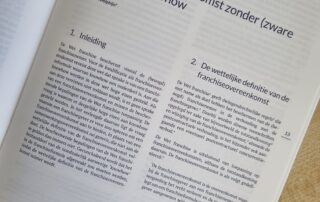First to the finish line: urgent interest in franchisee’s intention to join debt restructuring?
Recently, the provisional rights of the District Court of Rotterdam ruled in summary proceedings that the intention of a franchisee to submit a request to join the statutory debt rescheduling scheme for natural persons does not prevent obtaining an enforcement order in summary proceedings. However, there must be a sufficiently plausible urgent interest, which here lay in the fact that the franchisor would suffer damage if the debtor were to join the WSNP, because then only part of the existing claim could be collected and the franchisor would damage as much as possible.
In short, the case is as follows. The franchisee has concluded a franchise agreement with the franchisor for the operation of a confectionery shop in Middelburg. After some time, a second branch is opened in Vlissingen. In the period up to 2010, the franchisee’s debt to the franchisor continues to rise. The annual figures show that these debts are caused by declining results on the one hand, in combination with ever-increasing private withdrawals from the franchisee’s company. With the opening of the second store in Vlissingen, private withdrawals from both stores increased even further, while the results from this second store even remained negative. The debt owed to the franchisor, who was also a supplier of goods and a sub-lessor, became so high that the franchisor ended the franchise relationship. Proposals to pay off the remaining debt through a payment arrangement were rejected by the franchisee. No reasonable counterproposals were forthcoming. At the final proposal of (the lawyer of) the franchisor, the franchisee responded by stating that it preferred debt restructuring.
Franchisor, who was of the opinion that it had offered a more favorable arrangement than the debt rescheduling offers and saw the due date of its claim go up in smoke, decided to demand payment of the principal sum in summary proceedings, so that, in the period until the franchisee would be admitted to debt restructuring, to collect as much of its claim as possible, with the aim of limiting as much as possible the damage suffered by the franchisee as a result of joining the debt restructuring.
The franchisee argued in defense that the franchisor had brought this situation upon himself, since the franchisee would have been forced to purchase certain goods that were not popular in the places of business and the franchisee would have been forced to make investments. Moreover, the franchisor would have waited too long to propose a payment arrangement. This took more than a year to arrive.
The preliminary relief judge considered that there was sufficient urgency, now that the franchisor was indeed confronted with a situation in which it would not be able to collect its full claim if the franchisee joined the WSNP. The urgency lies in obtaining an enforcement order as soon as possible, in order to limit the damage to be suffered as much as possible until the moment the franchisee joins the WSNP. This consideration is further substantiated by the fact that the franchisee knew that he had a debt to the franchisor, but that, in the period between the end of the franchise relationship and the negotiation of a payment arrangement, he did not repay any part of the of the debt, while the franchisee has paid off other creditors.
With regard to the restitution risk, the preliminary relief judge considers that although the claim is fully recognized, there is apparently a discussion between the parties about its origin, now that the franchisee has put forward a defence. The provisional relief judge considers that the preliminary relief proceedings do not lend themselves to a judgment on this issue, but considers it opportune, in anticipation of a ruling by the court on the merits that the franchisor must compensate the loss suffered by the franchisee, to slightly reduce the advance on the claim. to limit.
The franchisor’s assertion that the franchisee is guilty of overconsumption and therefore does not meet the required criteria for accession to the preliminary relief proceedings, is not considered sufficiently proven by the preliminary relief judge and can therefore not be determined in advance. The summary proceedings would also not lend themselves to further investigation into this, and this is also not relevant in the present case for the award of the claim.
For franchisees, this ruling shows that it is important to start paying off at least part of the debts to the franchisor, despite the fact that no concrete payment agreements have yet been made, if you know that you have a debt at the franchisor. The fact that you cannot meet the payment obligations is in itself a ground to start a debt restructuring process, but it does not release you from your payment obligations. In any case, pay as much as your budget allows.
This ruling is relevant for franchisors, as it shows that, despite the fact that the franchisee indicates that he wishes to participate in the debt restructuring, there are still options to limit your damage. Therefore, do not just give up if someone indicates that they want to join the WSNP. This statement shows that you can finish first in a race to the finish.
Mr D. Uijlenbroek – Franchise lawyer
Ludwig & Van Dam Franchise attorneys, franchise legal advice. Do you want to respond? Mail to uijlenbroek@ludwigvandam.nl

Other messages
The franchise agreement without (heavy demands on) know-how
In the 2023-1 edition of Contracting magazine, I published a ...
Standstill period violation
On 15 March 2023, the District Court of Noord-Holland, ECLI:NL:RBNHO:2023:2636, ...
Violation post prohibition of competition, no fine!
The District Court of Zeeland-West-Brabant ruled on 15 March 2023, ...
Termination of the franchise agreement due to the introduction of the Franchise Act
On 28 February 2023, the Court of Appeal of 's-Hertogenbosch, ...
The penalty clause in the franchise agreement
They appear in almost every franchise agreement: penalty clauses. ...
The franchisee as the weaker party
Is the relationship between a supplier and a distributor similar ...







